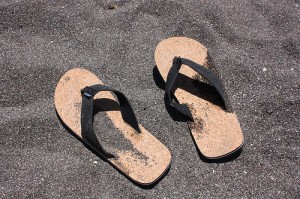Ah, summer! Outdoor air, sun, sports, sand, swimming, biking — and blisters, sunburns and broken bones.

Are you prepared to handle the most common summer injuries? I’ve found a two-pronged approach to be most helpful.
Prong #1: Prevention
Wrapping our boys in bubble wrap to prevent injury is not a good option. Boys need to climb, move and experience the world to develop into healthy human beings. So while I encourage activity and exploration, I insist on same basic safety measures:
- Bike helmets. By now, you’ve heard that bike helmets can prevent head injury. But did you know that boys have the highest death rate of all ages from bicycle-related head injury? Males account for 83 percent of bike-related deaths, and more than 70 percent of the non-fatal bike-related injuries. Wearing a helmet can drastically decrease the chances of serious injury.
- Life jackets.When around water, life jackets are a must. My boys know they must always wear one when boating, and I require the younger ones to wear them when fishing or near a body of water. (We take them along when we go swimming at state parks, for instance.) It is essential to make sure that the life jacket fits your son, though; adult-sized life jackets are not appropriate for most 10-year-old boys. For help selecting the best life jacket for your son, visit the US Coast Guard’s Boating Safety page.
- Sunscreen. Sunscreen is a tough sell for many boys. Mine hate to put it on, but they’re fair-skinned, fair-haired, blue-eyed boys, and even one serious sunburn in childhood can increase the risk of skin cancer later in life. The American Cancer Society advises everyone to Slip, Slop, Slap and Wrap to prevent sun-related injuries. That means slipping on a shirt and minimizing sun exposure whenever possible, slopping on sunscreen (more is better; many people use far too little sunscreen to be effective), slapping on a hat (baseball hats are popular here) and wrapping on sunglasses, to protect the eyes.
- Bug spray. I know that many parents are concerned about the chemicals in bug spray, and I understand that some parents don’t want to spray DEET, a toxic chemical, on their child’s skin. But where I live, mosquitoes (which can carry West Nile Virus) and ticks (which can spread Lyme disease) are very common, and both thrive in the woodland environments where we like to camp. In those environments, we use insect repellent containing DEET to minimize the chances of disease exposure — and we wash the chemicals off our skin as soon as possible. Here’s more info about using DEET-containing bug spray on kids.
- Common sense. Know your sons’ capabilities, and encourage activity and exploration while respecting your sons’ physical and emotional development. I would never allow my 7-year-old to fish at the river unattended, but I have no problem allowing my 12- or 15-year-olds to do so. That’s because I’ve watched my children carefully over the years. I know that my older boys are competent swimmers, that they follow safety rules and that they are safety conscious. They know how to handle fishing tackle safely, they know to leave an area is someone makes them feel uncomfortable and they know how to get help in case of emergency. I can’t tell you when your son is ready to fish — or swim, or bike — alone; all kids are ready at different times. Follow your instincts, though. They’re almost always accurate.
What summer safety measures do you use to keep the boys in your life safe?






